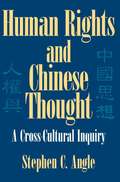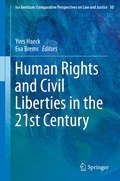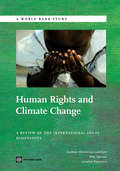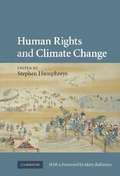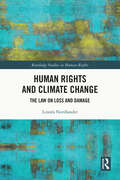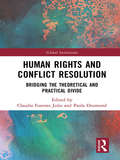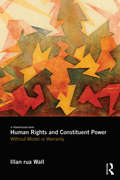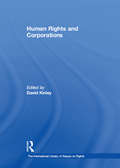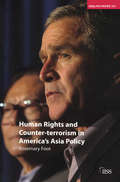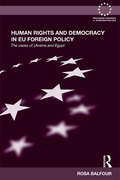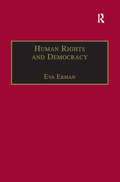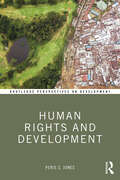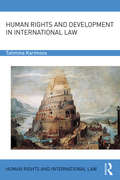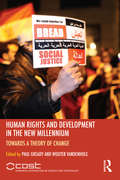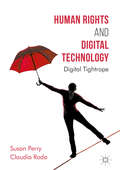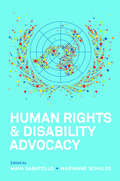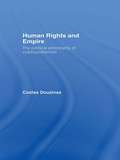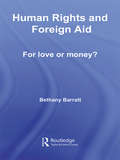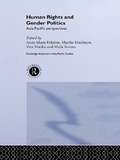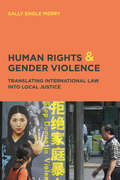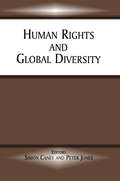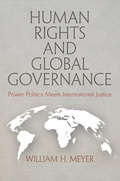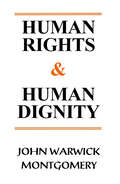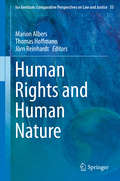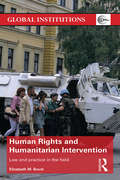- Table View
- List View
Human Rights and Chinese Thought: A Cross-Cultural Inquiry
by Stephen C. AngleWhat should we make of claims by members of other groups who have moralities different from our own? Human Rights in Chinese Thought gives an extended answer to this question in the first study of its kind. It integrates a full account of the development of Chinese rights discourse with philosophical consideration of how various communities should respond to contemporary Chinese claims about the uniqueness of their human rights concepts. The book elaborates a plausible kind of moral pluralism and demonstrates that Chinese ideas of human rights do indeed have distinctive characteristics, but it nonetheless argues for the importance and promise of cross-cultural moral engagement.
Human Rights and Civil Liberties in the 21st Century
by Eva Brems Yves HaeckThis volume contributes to the on-going legal discussion on pressing procedural and substantial law issues in the ambit of international human rights and civil liberties. While the 20th century has seen the true awakening of human rights, the 21st century poses new challenges to this ever-unfolding area of law. Not only do international tribunals and quasi-tribunals worldwide and domestic US and European continental courts have to deal with increasing numbers of complaints and petitions from individuals and groups on a vast array of societal problems, the legal issues put to them are sometimes extremely difficult to resolve as they relate to very sensitive issues. This book examines issues ranging from the status of human rights under US law to the status of the ECHR in the broader context of international law. It looks at the role of positive obligations in the case law of the Strasbourg Court, as well the impact of its case-law on childbirth and push-back operation towards boat people, but also at the growing unwillingness of ECHR member states to cooperate with the Strasbourg Court. It explores the new frontiers in US Capital punishment litigation, the first case before the International Criminal Court and the legal effect of judgments of the European Court on third states.
Human Rights and Climate Change
by Siobhan Mcinerney-Lankford Mac Darrow Lavanya RajamaniThis Study explores arguments about the impact of climate change on human rights, examining the international legal frameworks governing human rights and climate change and identifying the relevant synergies and tensions between them. It considers arguments about (i) the human rights impacts of climate change at a macro level and how these impacts are spread disparately across countries; (ii) how climate change impacts human rights enjoyment within states and the equity and discrimination dimensions of those disparate impacts; and (iii) the role of international legal frameworks and mechanisms, including human rights instruments, particularly in the context of supporting developing countries' adaptation efforts. The Study surveys the interface of human rights and climate change from the perspective of public international law. It builds upon the work that has been carried out on this interface by reviewing the legal issues it raises and complementing existing analyses by providing a comprehensive legal overview of the area and a focus on obligations upon States and other actors connected with climate change. The objective has therefore been to contribute to the global debate on climate change and human rights by offering a review of the legal dimensions of this interface as well as a survey of the sources of public international law potentially relevant to climate change and human rights in order to facilitate an understanding of what is meant, in legal terms, by "human rights impacts of climate change" and help identify ways in which international law can respond to this interaction. This is a complex and dynamically evolving legal and policy landscape and this study aims to capture its most salient features insofar as they appear at present. The Study employs the following three-part conceptual understanding of the links between human rights and climate change. First, climate change may affect the enjoyment of human rights: this is explored in part II and draws from the existing work of the United Nations (UN) Office of the High Commissioner for Human Rights (OHCHR), the UN Human Rights Council and the International Council on Human Rights Policy. Second, measures to address climate change may impact the realization of human rights. This is a subset of the discussion of "impacts" targeting "secondary" human rights impacts of measures aimed at addressing climate change. Third, human rights have relevance to policy and operational responses to climate change, such that human rights obligations (both substantive and procedural) may be relevant to the design and implementation of effective responses to climate change, particularly in relation to adaptation and to some extent also to mitigation. Human rights may also have a role in promoting resilience to climate change and may reinforce sustainable development goals. The Study includes a number of approaches from connecting climate change to specific human rights impacts under international human rights law, to tracing the applicable sources of law and surveying identifiable obligations under international human rights law and international environmental law. The Study reviews how human rights law addresses environmental protection in substantive and procedural terms focusing in particular on the advances made in the latter through the jurisprudence of regional human rights bodies for example. The Study considers also how environmental protection has been extended to regulate private as well as public action. Following from this is a discussion of the application of human rights to climate change, including an outline of the various ways in which human rights can be seen to "add value" to the discourse, including the use of human rights legal framework as a tool for helping analyse climate impacts and determining appropriate policy responses. The Study includes a summary analysis of principles and precepts of international human rights law and multilateral environmental agreements (MEA) to consider their compatibility in conceptual terms. It concludes wi...
Human Rights and Climate Change
by Stephen Humphreys Mary RobinsonAs the effects of climate change continue to be felt, appreciation of its future transformational impact on numerous areas of public law and policy is set to grow. Among these, human rights concerns are particularly acute. They include forced mass migration, increased disease incidence and strain on healthcare systems, threatened food and water security, the disappearance and degradation of shelter, land, livelihoods and cultures, and the threat of conflict. This inquiry into the human rights dimensions of climate change looks beyond potential impacts to examine the questions raised by climate change policies: accountability for extraterritorial harms; constructing reliable enforcement mechanisms; assessing redistributional outcomes; and allocating burdens, benefits, rights and duties among perpetrators and victims, both public and private. The book examines a range of so-far unexplored theoretical and practical concerns that international law and other scholars and policy-framers will find increasingly difficult to ignore.
Human Rights and Climate Change: The Law on Loss and Damage (Routledge Studies in Human Rights)
by Linnéa NordlanderThis insightful and timely book examines the intersection of international climate change law and international human rights law with respect to loss and damage from climate change. Bringing together these two areas of the law, the volume reframes the debate on loss and damage law and offers the first systematic analysis of the legal consequences of Article 8 of the 2015 Paris Agreement, both independently and in light of the concurrent applicability of human rights law to climate change harms. The author outlines the legal implications of Article 8 and the extent to which the application of a human rights perspective can contribute to the interpretation and development of those implications. Accessible and engaging, this book has important implications for both legal doctrine and policy development at the international level. This book is a valuable resource for scholars, students, and practitioners in human rights, human rights law, climate change law, and international environment law.
Human Rights and Conflict Resolution: Bridging the Theoretical and Practical Divide (Global Institutions)
by Claudia Fuentes Julio Paula DrumondHuman rights and conflict resolution have been traditionally perceived as two separate fields, sometimes in competition or in tension and occasionally with contradictory approaches towards achieving a lasting peace. Although human rights norms have been incorporated and institutionalized by various national, regional, and international organizations that deal with conflict resolution, negotiators and mediators are often pressured in practice to overlook international human rights principles in favor of compliance and more immediate outcomes. The chapters in this volume navigate the relationship between human rights and conflict resolution by fleshing out practical, conceptual, and institutional encounters of the two agendas and engaging with lessons learned and windows of opportunities for mutual learning. Recognizing the increasing relevance of this debate and important gaps in the current research on the topic, this book addresses the following questions: How can we improve our practical and theoretical understanding of the complementarity between human rights and conflict resolution? How would a human rights-based approach to conflict resolution look like? How are international, regional, and national organizations promoting, implementing, and/or adapting to better coordinate between human rights and conflict resolution? Building on empirical evidence from contemporary conflict resolution processes, how have human rights been integrated in different efforts on the ground? What are the main lessons learned in this regard? Examining a wide range of countries and issues, this work is essential reading for human rights, conflict resolution, and security experts including scholars, diplomats, policy-makers, civil society representatives, and students of international politics.
Human Rights and Constituent Power: Without Model or Warranty
by Illan rua WallWith the emergence of modern human rights in the Universal Declaration, what remained of a radical political potential of the discourse withdrew: statism and individualism became its authorised foundations and the possibilities of other human rights traditions were denied. The strife that once lay at the heart of human rights was forgotten in an increasing juridification. This book seeks to recover the radical political pole of human rights. It looks to the debates surrounding constituent power – the ‘power of the people’ – in order to understand different possibilities for the discourse. Using continental political philosophy and critical legal theory, Human Rights and Constituent Power presents a very different conception of human rights, more at home on the riotous streets than in courtrooms and parliaments.
Human Rights and Corporations (The International Library of Essays on Rights)
by David KinleyThe erstwhile unlikely coupling of human rights and corporations is now a typical feature of corporate/community relations. High-profile corporate infringements of human rights, the rise and rise of corporate social responsibility (CSR) and on-going efforts to regulate corporate behaviour through legal regimes, at both domestic and international levels, have spawned a mountain of academic literature and commentary. This volume assembles the leading essays from this body of work. Together they frame the relationship between human rights and corporations by charting its history and salient features; tackle the conceptual perspectives of the relationship and detail the practice, problems and potential of the relationship.
Human Rights and Counter-terrorism in America's Asia Policy (Adelphi series)
by Rosemary FootThis book examines the effects of the terrorist attacks on New York and Washington of 11 September 2001 on America's human rights and counter-terrorism policies towards a number of countries in Asia. Five countries have been chosen for examination, divided into two front-lines states (Pakistan and Uzbekistan), two second-front countries (Indonesia and Malaysia), and a third-front country, China. The paper also looks at changes in US domestic legislation and its treatment of prisoners at Guantanamo Bay and elsewhere in order to analyse the extent to which the US promotion of an external human rights policy might also have been compromised by its own legislative changes as a result of the struggle against terrorism. The paper concludes that the attacks on US territory, overall, have constrained America's willingness and capacity to promote an external human rights policy with respect to these five countries. However, some attention - especially at the rhetorical level - to these countries' human rights records has been retained to differing degrees among the five states. This degree of difference is not explained entirely in reference to a country's perceived centrality to the struggle against terrorism. It depends on the extent to which the US executive and legislative branches are united - either singly or in combination - in their disapproval of a state's record, or in their understanding about how best to reach the policy goals that are sought.
Human Rights and Democracy in EU Foreign Policy: The Cases of Ukraine and Egypt (Routledge Advances in European Politics)
by Rosa BalfourThis book investigates the disparity between rhetoric and performance in the European Union response to abuses of human rights and transgression of democracy. With the Arab spring putting the spotlight on the EU’s self-portrait as committed to promoting global human rights and democracy, this book examines the paradoxes of its international posture and the inconsistencies and double standards of its policies. With an informative and empirical approach examining EU relations since the end of the Cold War, this book seeks to uncover the reasons behind the Union’s actions and understand the foreign policy dilemmas and processes that guide its action. Including detailed analysis of Ukraine and Egypt, and the EU response to momentous changes for neighbouring nations, the author draws upon thoroughly-researched investigation into twenty years of EU foreign policy to create a framework using both EU Studies and International Relations. Providing a deeper analysis than other dominant explanations, this book presents new theories on the reasons behind the mismatch between words and deeds. An invaluable and timely volume, Human Rights and Democracy in EU Foreign Policy will be of interest to students and scholars of EU politics, International Relations and human rights policy.
Human Rights and Democracy: Discourse Theory and Global Rights Institutions
by Eva ErmanThis volume explores the relationship between human rights and democracy within both the theoretical and empirical field. It is a book within the tradition of deliberative democracy, although it focuses on global institutions and human rights rather than nation-state or federalist democracy. Eva Erman problematizes the absence of political rights in the global human rights discourse from a deliberative standpoint. Starting out from and at the same time criticizing Habermas' discourse theory of law and democracy, she makes a significant contribution to a discourse theory of human rights and applies it to a global rights institution, the United Nations' Commission on Human Rights. This is an innovative study that offers tools for democratizing existing global political institutions, and is therefore suitable for philosophers, political theorists, scholars of human rights and those interested in democracy.
Human Rights and Development (Routledge Perspectives on Development)
by Peris S JonesThe emergence of human rights within development and the evolving relationship was increasingly brought to bear upon key debates and policies over the last couple of decades. This book provides a critically informed, comprehensive and multi-disciplinary entry-level account of this engagement between human rights and development. It is theoretically and practically grounded and explores three over-arching questions and themes: First, why and how have human rights made this breakthrough? Second, is there agreement on human rights as a concept and how it is being used and understood within diverse development practices at global, national and local levels? Third, how can we gauge the impact of human rights based approaches upon development outcomes? The book concludes with what the future may hold for human rights and development. In-depth understanding of human rights as a development challenge and development as a human rights one, is presented and delineates the diverse responses and alternative critical approaches. Wide ranging in scope, it covers many examples of human rights within development, including global policy initiatives, and vulnerable groups, such as those living in poverty, socially excluded, people living with HIV/AIDS, residents of informal settlements, and human rights defenders. This textbook will be an essential resource for social science students, particularly in the fields of development studies, human rights and geography, as well as those interested in the intersection between law, human rights and social change. It should also appeal to practitioners in development and human rights.
Human Rights and Development in International Law (Human Rights and International Law)
by Tahmina KarimovaThis book addresses the legal issues raised by the interaction between human rights and development in contemporary international law. In particular, it charts the parameters of international law that states have to take into account in order to protect human rights in the process of development. In doing so, it departs from traditional analyses, where human rights are mainly considered as a political dimension of development. Rather, the book suggests focusing on human rights as a system of international norms establishing minimum standards of protection of individuals and minimum standards applicable in all circumstances on what is essential for a dignified existence. The various dimensions covered in the book include: the discourse on human rights and development interrelationship, particularly opinio juris and the practice of states on the question; the notion of international assistance and cooperation in human rights law, under legal regimes such as international humanitarian law, and emerging rules in the area of protection of persons in the event of disasters; the extraterritorial scope of economic, social and cultural rights treaties; and legal principles on the respect for human rights in externally designed and planned development activities. Analysis of these topics sheds light on the question of whether international law as it stands today addresses most of the issues concerning the protection of human rights in the development process.
Human Rights and Development in the new Millennium: Towards a Theory of Change
by Wouter Vandenhole Paul GreadyIn recent years human rights have assumed a central position in the discourse surrounding international development, while human rights agencies have begun to more systematically address economic and social rights. This edited volume brings together distinguished scholars to explore the merging of human rights and development agendas at local, national and international levels. They examine how this merging affects organisational change, operational change and the role of relevant actors in bringing about change. With a focus on practice and policy rather than pure theory, the volume also addresses broader questions such as what human rights and development can learn from one another, and whether the connections between the two fields are increasing or declining. The book is structured in three sections: Part I looks at approaches that combine human rights and development, including chapters on drivers of change; indicators; donor; and legal empowerment of the poor. Part II focuses on organisational contexts and includes chapters on the UN at the country level; EU development cooperation; PLAN’s children’s rights-based approach; and ActionAid’s human rights-based approach. Part III examines country contexts, including chapters on the ILO in various settings; the Congo; Ethiopia; and South Africa. Human Rights and Development in the new Millennium: Towards a Theory of Change will be of strong interest to students and scholars of human rights, development studies, political science and economics.
Human Rights and Digital Technology
by Claudia Roda Susan PerryAnalysing the convergence of law and regulation with rapidly evolving communications technologies, this interdisciplinary work navigates the intricate balancing act between human rights protection and technological innovation in a digital age, and illuminates the comprehensive potential of human rights to frame our intelligent use of technology. The authors address such pressing questions as how to protect user privacy online, whether digital pollution is a health hazard, who should have control and be responsible for data technologies and how to maintain human autonomy in a world of interconnected objects. By considering specific cases, this book provides an in-depth exploration of the many regulatory and technological choices citizens, states, civil society organizations and the private sector should consider to ensure that digital technology more fully serves human needs.
Human Rights and Disability Advocacy (Pennsylvania Studies in Human Rights)
by Maya Sabatello Marianne SchulzeThe United Nations adoption of the Convention on the Rights of Persons with Disabilities (CRPD) constituted a paradigm shift in attitudes and approaches to disability rights, marking the first time in law-making history that persons with disabilities participated as civil society representatives and contributed to the drafting of an international treaty. On the way, they brought a new kind of diplomacy forward: empowering nongovernmental stakeholders, including persons with disabilities, within human rights discourse. This landmark treaty provides an opportunity to consider what it means to involve members of a global civil society in UN-level negotiations.Human Rights and Disability Advocacy brings together perspectives from individual representatives of the Disabled People's Organizations (DPOs), nongovernmental organizations (NGOs), indigenous peoples' organizations, states, and national institutions that played leading roles in the Convention's drafting process. The contributors provide vivid and personal accounts of the paths to victory, including stumbling blocks—not all of which were overcome—and offer a unique look into the politics of civil society organizations both from within and in its interaction with governments. Each essay describes the nonnegotiable key issues for which they advocated; the extent of success in reaching their goals; and insights into the limitations they faced. Through the plurality of voices and insider perspectives, Human Rights and Disability Advocacy presents fresh perspectives on the shift toward a new diplomacy and explores the implication of this model for human rights advocacy more generally.Contributors: Andrew Byrnes, Heidi Forrest, Phillip French, Lex Grandia, Huhana Hickey, Markku Jokinen, Liisa Kauppinen, Mi Yeon Kim, Gerison Lansdown, Connie Laurin-Bowie, Tirza Leibowitz, Don MacKay, Anna MacQuarrie, Ronald C. McCallum AO, Tara J. Melish, Pamela Molina Toledo, Maya Sabatello, Marianne Schulze, Belinda Shaw.
Human Rights and Empire: The Political Philosophy of Cosmopolitanism
by Costas DouzinasErudite and timely, this book is a key contribution to the renewal of radical theory and politics. Addressing the paradox of a contemporary humanitarianism that has abandoned politics in favour of combating evil, Douzinas, a leading scholar and author in the field of human rights and legal theory, considers the most pressing international questions. Asking whether there ‘is an intrinsic relationship between human rights and the recent wars carried out in their name?’ and whether ‘human rights are a barrier against domination and oppression or the ideological gloss of an emerging empire?’ this book examines a range of topics, including: the normative characteristics, political philosophy and metaphysical foundations of our age the subjective and institutional aspects of human rights and their involvement in the creation of identity and definition of the meaning and powers of humanity the use of human rights as a justification for a new configuration of political, economic and military power. Exploring the legacy and the contemporary role of human rights, this topical and incisive book is a must for all those interested in human rights law, jurisprudence and philosophy of law, political philosophy and political theory.
Human Rights and Foreign Aid: For Love or Money? (Routledge Research in Human Rights)
by Bethany BarrattBy trying to alleviate poverty abroad, foreign development assistance tries to meet, among other things, basic human needs, which some schools of thought classify as basic human rights. However, because development abroad has often been treated as a tool for the pursuit of donor interests, rather than as an end to itself, it often ends up not only neglecting basic human rights, but making them worse. Bethany Barratt develops this argument by presenting a systematic external examination of the internal documentation of aid rationale in three major donor countries (Britain, Canada and Australia). The book sets the discussion of these documents in the context of the foreign policy process and structure of each donor, and contrasts it with the results of statistical analyses of key factors in aid. It shows that different criteria are applied to the various categories of recipient states, resulting in an inconsistent treatment of recipient rights as an aid criterion. While the book demonstrates important gulfs between rhetoric and reality, between elected policymakers and aid implementing agencies, and between the donors themselves, it comes to relatively optimistic conclusions about the general direction of foreign assistance and its increasingly pure focus on poverty alleviation. This substantive and important book will be invaluable to students, researchers and policymakers in the fields of politics, economics and development.
Human Rights and Gender Politics: Asia-Pacific Perspectives (Routledge Advances in Asia-Pacific Studies #Vol. 5)
by Vera Mackie Martha Macintyre Anne-Marie Hilsdon Maila StivensIn recent years, the slogan "women's rights are human rights" has become a central claim of the of the global women's movement. Human Rights and Gender Politics: Asia-Pacific Perspectives examines the critical issues raised by this embracing and expansion of the human rights discourse by feminists worldwide.This volume challenges the conventional, ungendered and male-centred analysis of the politics of human rights and addresses the future of global feminisms. It is essential reading for all those interested in learning more about human rights and women's rights in the Asia-Pacific region.
Human Rights and Gender Violence: Translating International Law into Local Justice
by Sally Engle MerryIn this study that investigates the tensions between global law and local justice, Sally Engle Merry offers an insider's perspective on how human rights law holds authorities accountable for the protection of citizens even while reinforcing and expanding state power.
Human Rights and Global Diversity
by Peter Jones Simon CaneyThis examination of global society focuses on its conflict with local societies and questions whether the human race should be treated as belonging to a single global community. It considers the universality of human rights and its conflict with group claims to self-determination.
Human Rights and Global Governance: Power Politics Meets International Justice (Pennsylvania Studies in Human Rights)
by William H. MeyerInternational human rights have been an important matter for study, policy, and activism since the end of World War II. However, as William H. Meyer observes, global governance is not only a relatively new topic for students of interational relations but also a widely used yet often contested concept. Despite the conflicting and often politicized uses of the term, three key dimensions of global governance can be identified: the impact of diplomatic international organizations such as the International Criminal Court, the importance of nonstate actors and global civil society, and global political trends that can be gleaned from empirical observation and data collection. In Human Rights and Global Governance, Meyer defines global governance generally as the management of global issues within a political space that has no single centralized authority.Employing a combination of historical, quantitative, normative, and policy analyses, Meyer presents a series of case studies at the intersection of power politics and international justice. He examines the global campaign to end impunity for dictators; the recognition, violation, and protection of indigenous rights; the creation and expansion of efforts to ensure corporate social responsibility; the interactions between labor rights and development in the Global South; just war theory as it applies to torturing terrorists, war crimes in Afghanistan and Iraq, and the drone wars; and the global strategic environment that best facilitates the making of human rights treaties. Meyer concludes with an evaluation of the successes and failures of two exemplary models for the global governance of human rights as well as recommendations for public policy changes and visions for the future.
Human Rights and Human Dignity
by John Warwick MontgomeryNo one is against human rights. It is obviously a good thing-until one starts to think about the meaning of the term and its implications. Then it shows itself to be an idea that polarizes, encouraging uncritical support and also extreme reaction from both secularists and religionists. John Warwick Montgomery, who is both a lawyer and a theologian, is uniquely qualified to address the question of human rights. In clear, easily understood language, he analyzes what human rights are and addresses the crucial question, "How can human rights, properly understood, be legitimated?" Montgomery shows that is there is a foundation for human rights, it must be sought in a transcendent perspective, in the revelational content of the Bible.
Human Rights and Human Nature
by Thomas Hoffmann Marion Albers Jörn ReinhardtThis book explores both the possibilities and limits of arguments from human nature in the context of human rights. Can the concept of human nature provide a basis for understanding fundamental rights? Is it plausible to justify the claim to universal validity of human rights by reference to human nature? Or does the idea of human rights in its modern, post-1945 manifestation go, in essence, beyond human nature? The essays in this volume introduce naturalistic positions and their concomitant critiques. They address the role that human nature both actually does and potentially may play in forming a foundation for and acting as an exemplification of fundamental rights. Beyond that, they give attention to the challenges caused by Life Sciences. Human nature itself is subject to transformation and transgression in an unprecedented manner. The essays reflect on issues such as reproduction, species manipulation, corporeal autonomy and enhancement. Contributors are jurists, philosophers and political scientists from Germany, Switzerland, Turkey, Poland and Japan.
Human Rights and Humanitarian Intervention: Law and Practice in the Field (Global Institutions)
by Elizabeth M. BruchHuman rights, peacekeeping, and humanitarian intervention have emerged in the past decades as important components of international law and practice. Adopting a methodology of Institutional Ethnography informed by Actor-Network Theory, this book traces the practices of law and expertise from global IGO headquarters to the ‘field’ and back again, and through various contemporary field missions from Bosnia to Afghanistan and East Timor to Sierra Leone. It answers several fundamental questions: How is human rights law engaged in ‘establishing the peace,’ ‘rebuilding the nation,’ and ‘restoring the rule of law’ in post-conflict situations? How do human rights experts use law in their everyday work in the context of humanitarian intervention? How are law and expertise established, sustained and transformed in the field? Offering a complex and nuanced explanation of humanitarian intervention based upon a multi-dimensional understanding of law and power, this book will be of interest and use to scholars, students and practitioners in international law and policy, human rights, and humanitarian intervention. Its cross-disciplinary approach should also appeal to the professional communities engaged directly and indirectly with projects of humanitarian intervention – including staff at inter-governmental organizations, international lawyers and practitioners, and activists.
